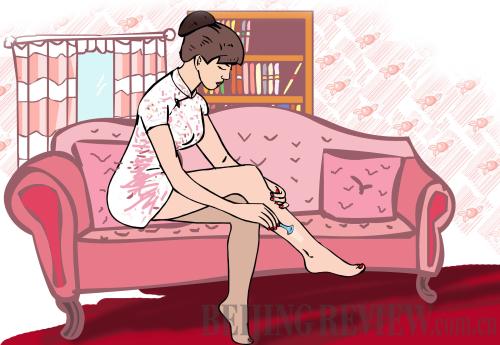|
 |
|
(LI SHIGONG) |
It is a hot, sweltering summer day in China. You are on a humid bus full of sweaty people. You lean your head on a post and hastily avert your eyes. Now you are on Huaihai Street, in Shanghai's busy shopping district. It is sale season and you are trying on the latest from H&M or Zara's spring collection. You step outside the dressing room to a wall of mirrors where other women are admiring themselves, and your jaw drops.
Body hair. It remains a shocking sight in one of China's biggest cities, whereas female urbanites elsewhere would normally groom to stay hairless.
The hairless image of beauty from other parts of the world has triggered an increase in consumer spending for products and services that achieve this standard. This hair-free image mainly targets women but some have hit men too. Celebrity endorsements, easily available hair removal products and the cropping up of hair removal services have made the look easy to attain. Chinese women with puffs of armpit hair walk gaily in sleeveless shirts—even those who wax their legs regularly, even in the winter, and talk casually about trimming their unmentionables.
A project led me to seek out hair removal salon owners and brand managers of hair removal products, and they all said the same thing: Beauty standards in China have never required being hairless. Removing body hair is a relatively new occurrence for most Chinese and is gaining traction with increased exposure to cultures that are less tolerant of excess hair.
The director of a waxing salon likened the introduction of this new standard to the introduction of anti-dandruff shampoo in China. Dandruff, she said, was once a visible problem in China. Companies thought their sales would skyrocket once entering the country, but they didn't. Marketers were left scratching their heads (pardon the pun), unsure of where they went wrong. They then did what any good marketing team would do: They sent their research teams into the field to see what was going on.
As it turned out, having dandruff wasn't actually a big deal back then. Their problem was that dandruff wasn't yet seen as a social stigma.
Body hair is now in a similar phase, as a non-issue even to urbanites.
Some local friends say that even though they groom their body hair, they understand why others do not. It depends on what a person thinks is beautiful, a friend told me, though she added that she prefers women to shave their armpits.
Two years ago, it was still a difficult mission to find wax strips. Today, at Watson's, I found an entire row dedicated to razors, dilapidating creams, wax strips, tweezers, and some sort of sponge with a dilapidating cream.
If those interviews, reports and my Watson's adventure are any indication, it seems this view of beauty is changing, at least in metropolises. Sales have doubled as grooming body hair becomes a part of women's beauty regimens. A waxing salon that once catered to a 5-percent Chinese client is now proud to report 20 percent of their business comes from locals, though the 20 percent largely consists of those who have worked, travelled or studied abroad.
Although I do not doubt the rapid pace at which big cities are accepting this standard of beauty, I am still unsure of the overall quality. Spas and salons tell me that their main issue is hygiene and that quality products are still hard to find. Their entire stock is imported because they do not want to risk injuring clients with something potentially unsafe. My male friends lament the difference in the quality between razors from North America and here. Even the same model of the same product line may be of lesser quality. Comparing the two, it is clear that the Chinese one was made of cheap plastic while the North American version was metal. Then they ranted about the blades.
While it is interesting and selfishly more convenient for me to see more people accept or embrace body hair removal, the trend must go on with more than just sales in mind. As a seemingly trivial topic, I believe it must be discussed delicately because it still touches upon taboo topics of how one views their body. Beauty will always be a tricky subject because it is never black and white. Hairless or hairy, what is black to one might be white for another. In the end, no one can truly define what is beautiful. The old adage persists that beauty is in the eye of the beholder.
The author is a Canadian living in Beijing
Email us at: liuyunyun@bjreview.com
| 